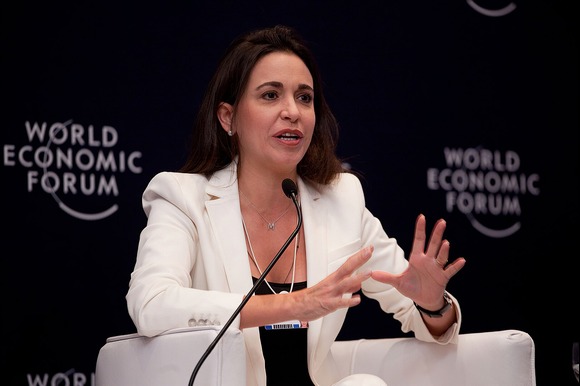Venezuelan Opposition Leader Honored for Peaceful Struggle Against Authoritarianism
The 2025 Nobel Peace Prize has been awarded to María Corina Machado, the Venezuelan opposition leader recognized globally for her unwavering fight to restore democracy and human rights in her country. The Norwegian Nobel Committee announced the decision in Oslo, honoring Machado’s courageous advocacy for peaceful political transition in Venezuela.
Machado will receive the prestigious award on December 10, 2025, along with a monetary prize of 9 million Swedish kronor (approximately $820,000).
Recognition of Courage and Democratic Values
The Nobel Committee commended Machado for her “tireless commitment to democratic principles, transparency, and civil rights”, describing her as a symbol of peaceful resistance against authoritarian rule.
Despite being barred from running for president, facing harassment and threats, and enduring political persecution, Machado has continued to campaign for free elections and good governance in Venezuela.
Her selection for the 2025 Peace Prize is seen as a strong message of global solidarity with those who continue to defend democratic freedoms under oppressive regimes.
Background: A Symbol of Hope Amid Crisis
María Corina Machado has been one of the most influential voices in Venezuela’s pro-democracy movement. For years, she has called for non-violent political reform, institutional accountability, and international awareness of her country’s humanitarian crisis.
The Nobel Committee’s decision is being interpreted as both a recognition of her personal bravery and a statement against Venezuela’s long-standing political repression.
According to analysts, the award also highlights the importance of grassroots democratic activism at a time when several nations are witnessing the erosion of civil liberties.
International Reactions: Global Praise and Political Impact
The announcement has triggered widespread reactions around the world.
Human rights groups, democratic governments, and international observers have praised the Nobel Committee’s decision as a powerful affirmation of democratic resilience.
In Venezuela, the news has sparked renewed hope among opposition supporters, who view the recognition as validation of their long struggle for political freedom.
International media outlets have contrasted Machado’s win with earlier speculation that former U.S. President Donald Trump might receive the award. His supporters had lobbied for his nomination, but the Committee’s choice underscored its emphasis on human rights and peaceful reform, rather than political rhetoric.
A Turning Point for Venezuela’s Democracy Movement
Machado’s Nobel Peace Prize could significantly influence Venezuela’s domestic and international political dynamics. Experts believe it will increase pressure on the government to allow fair elections and strengthen global attention toward Venezuela’s human rights situation.
The award is also expected to energize pro-democracy movements across Latin America, where several countries continue to struggle with corruption, repression, and declining civic freedoms.
Machado’s Response: Gratitude and Resolve
Upon learning of the honor, María Corina Machado expressed deep gratitude and renewed determination to continue her peaceful campaign for democratic reform.
“This prize belongs to every Venezuelan who has not lost hope,” she said in a brief statement shared with international media. “It is a recognition of our people’s courage to fight for freedom through peaceful means.”
The Nobel Peace Prize and Its Global Message
The 2025 award reinforces the Nobel Peace Prize’s tradition of celebrating individuals who defend democracy, justice, and nonviolence in the face of adversity.
Observers note that the Nobel Committee’s choice serves as a reminder that global peace depends on political freedom, civic courage, and accountability — values that María Corina Machado continues to embody.






